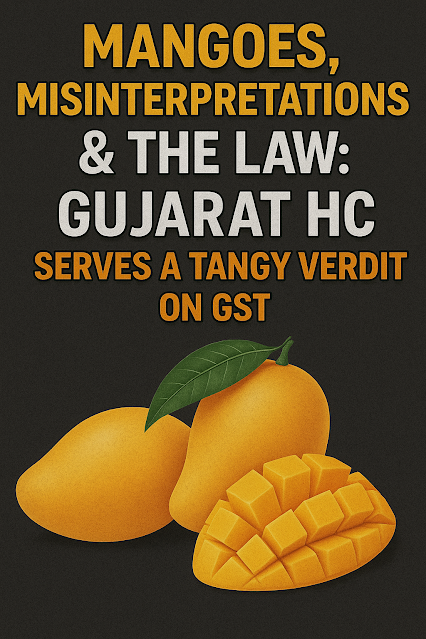The Gujarat High Court recently delivered a significant verdict regarding the Goods and Services Tax (GST) applicable to mango pulp. This decision brings much-needed clarity for businesses in the food processing industry, particularly those dealing with mango-derived products.
Here's a breakdown of the key aspects of
the case and the court's ruling:
The Dispute:
- A supplier, Harshad Mango Products ,
argued that mango pulp should be taxed at a 5% GST rate, claiming it was
derived from sliced and dried mangoes which attract the concessional 5%
rate.
- The tax department, however, asserted
that mango pulp falls under the category of "mangoes other than
sliced and dried" and is subject to a 12% GST rate, citing relevant
notifications and a clarification circular.
The Gujarat High Court's Verdict (Harshad
Mango Products Pvt. Ltd vs Union Of India on 23 April, 2025):
- The High Court upheld the
department's position, ruling that mango pulp is taxable at 12% GST.
- The court clarified that mango pulp
is neither fresh mango (which is GST exempt) nor sliced and
dried mangoes.
- It emphasized that the 12% rate has
been in effect since the introduction of GST in July 2017, and the
relevant notifications and circulars merely served as clarifications, not
retrospective amendments.
- The court also rejected the
revenue officials' contention that mango pulp should attract an 18%
GST under the residual entry for items not specifically categorized.
Key Legal Observations:
- The court referred to its previous
decision in Vimal Agro Products Pvt. Ltd. v. Union of India on 24
April, 2024, where a similar issue regarding mango pulp GST was addressed.
- It noted that the Harmonized System
of Nomenclature (HSN) Chapter 08.04, which covers edible fruits and nuts,
only refers to fresh or dried mangoes, not pulp.
- Entry 30A of Schedule I, which offers
a 5% rate, specifically applies only to sliced and dried mangoes.
- The court confirmed that Circular
179/11/2022 and Notification 6/2022 were clarificatory in nature,
reinforcing the existing 12% GST rate on mango pulp.
Implications for Businesses:
- Companies involved in the production
and sale of mango pulp need to ensure they have been consistently applying
the 12% GST rate since July 2017.
- Businesses that applied lower rates
may face back tax assessments and potential penalties.
- This ruling emphasizes the importance
of correctly classifying products and understanding the applicable GST
rates to avoid disputes with tax authorities.
In essence, the Gujarat High Court's "tangy verdict" affirms that mango pulp falls under the 12% GST category, putting an end to past interpretations and providing a clear framework for tax compliance in the mango processing industry.





No comments:
Post a Comment